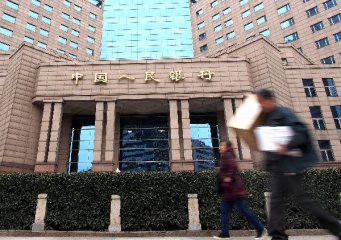BEIJING, Feb. 3 (Xinhua) -- China's central bank pumped 1.2 trillion yuan (about 173.3 billion U.S. dollars) into the financial system via reverse repos on Monday.
The People's Bank of China (PBOC) injected 300 billion yuan into the market through seven-day reverse repos at an interest rate of 2.4 percent, and conducted 900 billion yuan of 14-day reverse repos at an interest rate of 2.55 percent.
Meanwhile, 1.05 trillion yuan of reverse repos matured Monday, resulting in a net injection of 150 billion yuan. This will lead to 900 billion yuan more liquidity in the banking system than that recorded in the same period last year, the PBOC said.
The move aims to offset the impact of reverse repos maturing and the concentrated maturing of financial market funds and to keep liquidity in the banking system at a reasonably sufficient level in the epidemic control period, according to a statement on the website of the central bank.
The PBOC will continue to pay close attention to the liquidity situation and maintain macro liquidity at a reasonably ample level, the statement said.
A reverse repo is a process in which the central bank purchases securities from commercial banks through bidding, with an agreement to sell them back in the future.
The People's Bank of China (PBOC) injected 300 billion yuan into the market through seven-day reverse repos at an interest rate of 2.4 percent, and conducted 900 billion yuan of 14-day reverse repos at an interest rate of 2.55 percent.
Meanwhile, 1.05 trillion yuan of reverse repos matured Monday, resulting in a net injection of 150 billion yuan. This will lead to 900 billion yuan more liquidity in the banking system than that recorded in the same period last year, the PBOC said.
The move aims to offset the impact of reverse repos maturing and the concentrated maturing of financial market funds and to keep liquidity in the banking system at a reasonably sufficient level in the epidemic control period, according to a statement on the website of the central bank.
The PBOC will continue to pay close attention to the liquidity situation and maintain macro liquidity at a reasonably ample level, the statement said.
A reverse repo is a process in which the central bank purchases securities from commercial banks through bidding, with an agreement to sell them back in the future.




















Latest comments